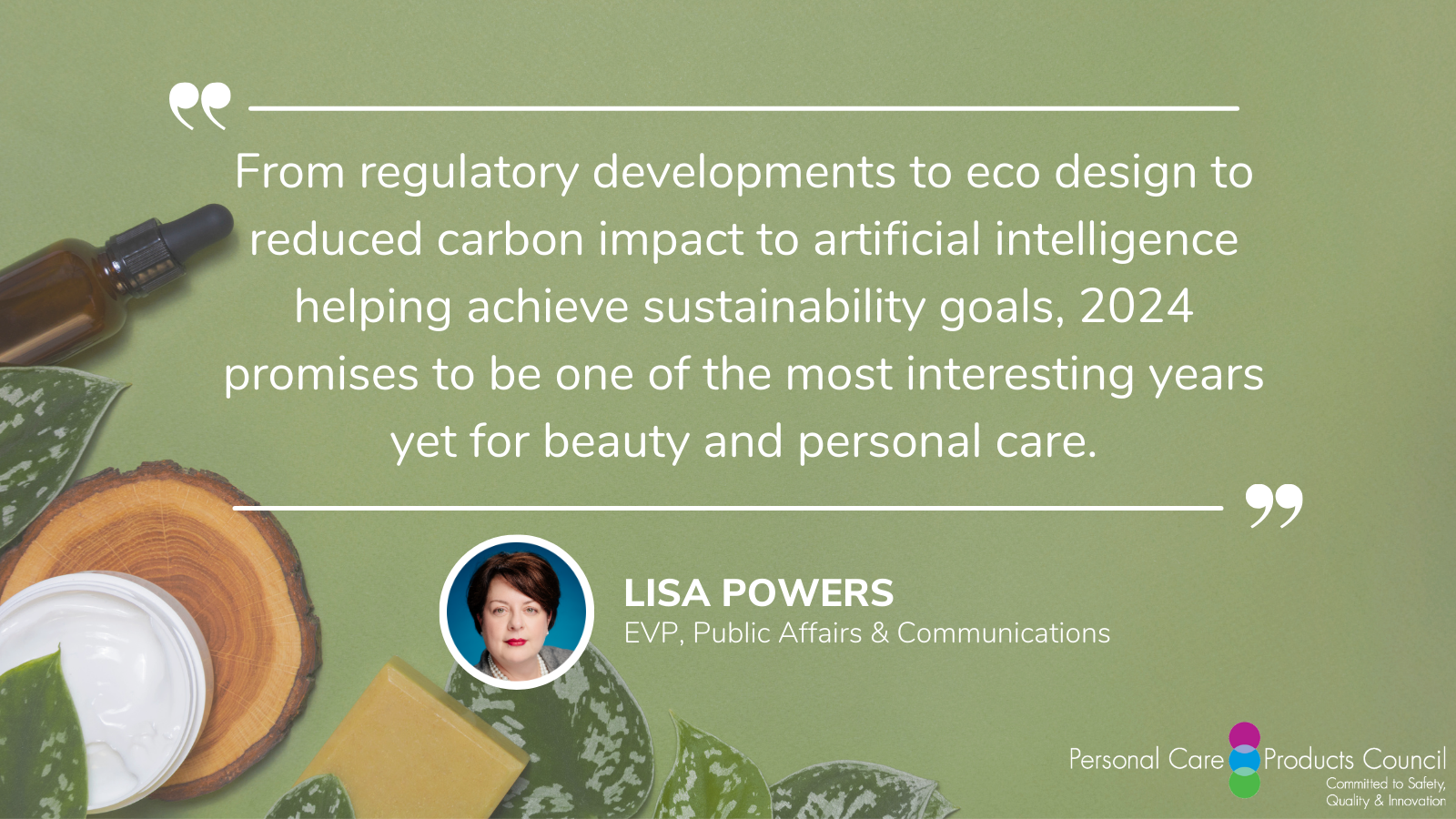2024 Sustainability and Impact Predictions
By Lisa Powers
EVP, Public Affairs & Communications
After a year of exciting regulatory developments, renewed consumer interest in science and sustainability, and personal care brands leading the way in innovation, 2024 promises to be one of the most interesting years yet for beauty and personal care. We are pleased to share our key predictions on sustainability and social impact issues for this coming year. To bring these predictions to life, we asked for input from Cara Eaton, sustainability director at Croda, and Pamela Gill-Alabaster, global head of ESG & Sustainability, Kenvue.
Regulatory Developments in the U.S. and EU
Emerging regulatory standards in the United States, European Union and United Kingdom are on the forefront of most companies’ minds. With new requirements affecting everything from environmental marketing claims and extended producer responsibility for packaging to ethical and deforestation-free sourcing of key commodities like palm oil, the need for companies to have end-to-end chain of custody traceability of their supply chains has never been greater. We expect companies to enhance their due diligence on source traceability to address these regulatory requirements and place a greater emphasis on visibility and engagement along all stages of the value chain.
“Companies around the world will be challenged to address the increasing global regulatory requirements for nonfinancial disclosure of ESG-related impacts, risks, and opportunities. It will become increasingly important that these disclosures have the same data rigor and assurance used today for financial reporting. These dynamics will not only foster greater collaboration between the ESG function and the financial comptroller’s office, but it will also drive demand for better tools for data collection, governance, measurement, auditability and reporting.”
– Pamela Gill-Alabaster, Global Head of ESG & Sustainability, Kenvue
Eco Design
Brands have started exploring “eco design” to address many of these new regulatory requirements and consumer demands. Eco design considers science-based tools that assess the environmental impact at all stages of the product development process to make the lowest possible environmental impact through a product’s lifecycle. Brands are creating a vision for sustainability by incorporating more sustainable materials in primary and secondary packaging, identifying end-of-life and re-use opportunities, and assessing impacts throughout the raw material supply chains. We anticipate novel product and packaging solutions to hit the market in 2024, highlighting eco-design principles and opening up the benefits of sustainability to more consumers.
Net Zero Pledges, Science-Based Targets and Carbon Impact
Companies are making bold commitments to reduce (or even negate) their carbon impact. PCPC member companies are committed to reducing their energy consumption by transitioning to lower carbon or renewable sources of energy. Many are ambitiously cutting their greenhouse gas (GHG) emissions while implementing mitigation, adaptation and resilience strategies. As consumers become increasingly interested in understanding these decarbonization pledges and targets, expect to see companies testing new methods to establish, substantiate and communicate their commitments.
“[I]nnovative solutions to address these challenges are in play across a variety of areas and offer some exciting opportunities to deliver impact. However, the challenges for innovation come from speed of development, scalability of solutions and the development of viable commercial pathways, among others.”
– Cara Eaton, Sustainability Director – Consumer Care, Croda Inc.
Technology and Transparency
PCPC members have leveraged technologies like blockchain, satellite imagery and artificial intelligence to achieve many of these sustainability goals. These technologies can drastically expand opportunities for sustainability by providing accurate data on greenhouse gas emissions, tracking raw material supply chains to the upstream source, and streamlining shipping and transportation of products from production to retail.
“On positive impact, both environmental (especially as relates to nature) and social elements (for people all along the value chain) are and will be a key consideration for integration to climate strategy to avoid shifting the burden. Science-based data points and traceability help to make the right decisions, offering opportunities for improved impact.”
– Cara Eaton, Sustainability Director – Consumer Care, Croda Inc.
Diversity, Equity and Inclusion (DEI) and Accessibility
While many companies struggle with the politicization of DEI initiatives, we predict that consumers will continue to expect products that are designed with intention for our diverse society. PCPC established the Madam C.J. Walker Award for Excellence in DEI to recognize individuals making demonstrable commitments to DEI in the beauty and personal care industry. Past recipients include Latriece Watkins of Walmart and Esi Eggleston Bracey of Unilever. This year’s award will again be presented by Madam Walker’s great-great-granddaughter A’Lelia Bundles, an American journalist, news producer and author.
MoCRA
The Modernization of Cosmetics Regulation Act (MoCRA) is one of the biggest regulatory updates in cosmetics in recent history. PCPC has been a staunch advocate of MoCRA and continues to provide industry’s feedback to the U.S. Food and Drug Administration (FDA) on the agency’s implementation of MoCRA. Enacted at the end of 2022, the industry has now had a year to process new requirements under MoCRA. Many of the new provisions became enforceable at the end of 2023, including safety substantiation, adverse event reporting, records access and labeling. Because of the significant consumer buzz around MoCRA, industry leaders should expect to see increased levels of consumer engagement in 2024. We also expect to see brands engaging more deeply with suppliers to facilitate compliance with MoCRA provisions, especially those requiring a deeper level of information about products and their ingredients.
“The beauty and personal care products industry has always been driven by innovation. We are now at a transformational moment in our journey. Advances in sustainability and societal engagement offer exciting new frontiers to make significant impacts on our stakeholders – employees, customers, consumers, our supply chains and communities. Together, we can embrace the challenges and the opportunities ahead to build a more resilient, relevant and beautiful world for us all.”
– Thomas F. Myers, President & CEO, PCPC

